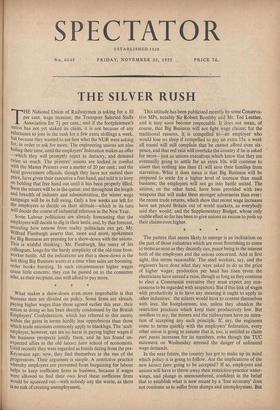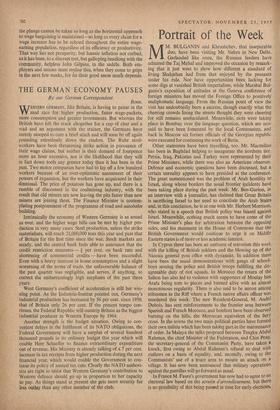THE SILVER RUSH
THE National Union of Railwaymen is asking for a 10 per cent. wage increase; the Transport Salaried Staffs Association for 7f per Wit.; and if the footplatemen's union has not yet staked its claim, it is not because of any reluctance to join in the rush for a few extra shillings a week, but because they wanted to see first what the NUR were asking for, in order to ask for more. The engineering unions are also biding their time, until the employers' federation makes an offer —which they will promptly reject as derisory, and demand twice as much. The printers' unions are locked in combat with the Master Printers over a matter of 20 per cent.; and the local government officials, though they have not named their price, have given their executive a free hand, and told it to keep on holding that free hand out until it has been properly filled. Soon the miners will be in the queue; and throughout the length and breadth of industry and administration, the winter wage campaign will be in full swing. Only a few weeks are left for the employers to decide on their attitude—which in its turn will decide the course of industrial relations in the New Year.
Some Labour politicians are already forecasting that the employers will decide to dig in their heels, and, by that forecast, revealing how remote from reality politicians can get. Mr. Wilfred Fienburgh asserts that, more and more, spokesmen for Big Business are pressing for a show-down with the unions. This is wishful thinking : Mr. Fienburgh, like many of his colleagues, longs for the•hardy simplicity of the old-time boss- worker battle. All the indications are that a show-down is the last thing Big Business wants at a time when sales are booming, order books bursting. In such circumstances higher wages cause little concern; they can be passed on to the consumer who, as their recipient, can well afford to pay more.
* * What makes a show-down even. more improbable is that business men are divided on policy. Some firms are already paying higher wages than those agreed earlier this year. their action in doing so has been sharply condemned by the British Employers' Confederation, which has referred to this enemy within the gates in terms hardly less opprobrious than those Which trade unionists commonly apply to blacklegs. The 'scab' employer, however, can see no harm in paying higher wages if his business prospects justify them, and he has found un- expected allies in the old laissez faire school of economists. Until recently they were regarded as fossils dating from the pre- Keynesian age; now, they find themselves in the van of the progressives. Their argument is simple. A restrictive practice whereby employers are prevented from bargaining for labour helps to keep inefficient firms in business, because if wages were allowed to find their own level these inefficient firms would be squeezed out—with nobody any the worse, as there is no risk of creating unemployment. This attitude has been publicised recently by some Conserva- tive MPs, notably Sir Robert Boothby and Mr. Ted Leather, and it may soon become respectable. It does not mean, of course, that Big Business will not fight wage claims; for the traditional reasons, it is compelled to—an employer who would lose no sleep if compelled to pay an extra 15s. a week all round will still complain that he cannot afford even six- pence, and that red ruin will overtake the country if he is asked for more—just as unions executives which know that they are eventually going to settle for an extra 10s. will continue to assert that nothing less. than E1 will save their families from starvation. What it does mean is that Big Business will be prepared to settle for a higher level of increase than small business; the employers will not go into battle united. The unions, on the other hand, have been provided with two weapons that will make them stronger adversaries than ever: the recent trade returns, which show that recent wage increases have not priced Britain out of world markets, as everybody said they would; and the Supplementary Budget, whose only visible effect so far has been to give unions an excuse to push up their claims even higher.
* *
The pattern that seems likely to emerge is an inclination on the part of those industries which are most flourishing to come to terms as soon as they decently can, peace being in the interest both of the employers and the unions concerned. And at first sight, this seems reasonable. The steel workers, say, and the engineers have done what they were asked to do as the price of higher wages; production per head has risen (even the electricians have earned a raise, though as long as they continue to elect a Communist executive they must expect any con- cessions to be regarded with suspicion). But if this link of wages with productivity is to have any meaning it ought to apply to other industries : the miners would have to content themselves with less; the footplatemen, too, unless they abandon the restrictive practices which keep their productivity low. But needless to say, the miners and the railwaymen have no inten- tion of accepting any such principle. If, say, the engineers come to terms quickly with the employers' federation, every other union is going to assume that it, too, is entitled to claim pari passu increases for its members, even though the TUC statement on Wednesday stressed the danger of unlimited wage demands.
In the near future, the country has got to make up its mind which policy it is going to follow.'Are the implications of the new laissez faire going to be accepted? If so, employers and unions will have to throw away their restrictive-practice water- wings, and plunge in unencumbered, confident in the belief that to establish what is now meant by a 'free economy' does not condemn us to suffer from slumps and unemployment. But the plunge cannot be taken so long as the horizontal approach to wage bargaining is maintained—so long as every claim for a wage increase has to be echoed throughout the entire wage- earning population, regardless of its efficiency or productivity. That way lies not prosperity, but lunatic inflation not curbed, as it has been, to a discreet trot, but galloping headlong with the community, helpless John Gilpins, in the saddle. Both em- ployers and unions must realise this, when they come to grips in the next few weeks, for On their good sense much depends.



























































 Previous page
Previous page